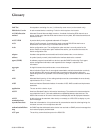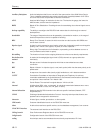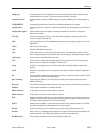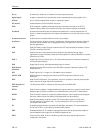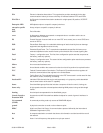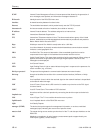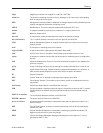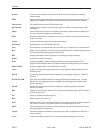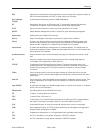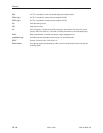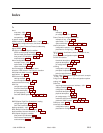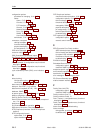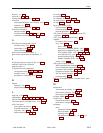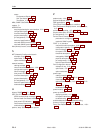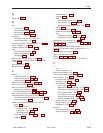
Glossary
GL-8
3160-A2-GB21-80
March 1999
A set of rules that determines the behavior of devices in achieving and maintaining
communication.
Public Switched Telephone Network. A network shared among many users who can use
telephones to establish connections between two points. Also known as dial network.
Test Patterns branch of the DSU/CSU menu tree.
A measure of the number of ones (marks, pulses) in relation to the total number of bits
transmitted.
Quasi-Random Signal Source. A test pattern simulating a random pattern of digital ones
and zeros used to simulate normal transmission.
Random-Access Memory. Read/write memory that is volatile and loses its contents when
power is removed.
A part of the device’s memory that holds stored values.
Release branch of the DSU/CSU menu tree.
An initialization of the device that occurs at power-up or in response to a reset command.
Request for Comments. One of the documents published by the Internet Engineering Task
Force that describe Internet protocols and policies.
Routing Information Protocol. A protocol for exchanging routing information.
An 8-position modular connector.
Repeater LoopBack. Loops the signal being sent to the network back to the DTE
Drop/Insert and data ports after it has passed through the framing circuitry of the device.
Remote Loopback branch of the DSU/CSU menu tree.
A device that connects LANs by dynamically routing data according to destination and
available routes.
An Electronic Industries Association’s standard for a low-speed, 25-position, DCE/DTE
interface.
RFC 1659, which defines objects for managing RS-232-type interfaces (e.g., RS-422,
RS-423, etc.) and supports synchronous data ports and management communication
ports on the device.
An Electronic Industries Association’s standard for a general-purpose, 37-position,
DCE/DTE interface.
Request to Send. A signal from the DTE to the device, indicating that the DTE has data to
send. V.24 circuit 105.
Receive. To obtain transmitted signals.
Receive Clock. V.24 circuit 115.
Received Data. Pin 3 of the EIA-232 interface that is used by the DTE to receive data from
the modem. Conversely, the modem uses Pin 3 to transmit data to the DTE.
Shared Diagnostic Control Panel. A feature that allows carrier-mounted devices to share
the same diagnostic control panel.
A test that checks most hardware components when power is applied to the device or a
reset is initiated.
A device that offers a specific service, such as database management, to a client.
protocol
PSTN
Ptrns branch
pulse density
QRSS
RAM
register
Rel branch
reset
RFC
RIP
RJ48C
RLB
Rlpbk branch
router
RS-232
RS-232-like MIB
RS-449
RTS
RX
RXC
RXD
SDCP
self-test
server




